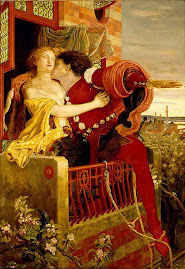.jpg) Another day away from Romeo because of my cold symptoms. It's been a week since I've seen him. This is getting old.
Another day away from Romeo because of my cold symptoms. It's been a week since I've seen him. This is getting old.He called me this afternoon. "What are you doing?"
Me, with a scratchy voice: "I'm about ready to get some lunch."
"Oh, good."
"What are you doing?"
"Are you coming to see me soon?"
"I still have cold symptoms."
"Oh, are you drinking lots of orange juice?"
"All I have in the house right now is grape juice and apple juice."
"Get some orange juice. It's much better for you."
"Okay."
"Juliet, this will sound silly."
"Probably not to me. What is it?"
"Well, I know it's been a long time since you've been to visit. And I know it's because of your cold."
"Yes."
"But, I know this is silly, but I can't help but feeling that one day you'll abandon me." I could hear the tears in his voice, which made me tear up.
"Oh, Romeo, you're right. It's silly."
"I know." More crying from both of us. Gosh, we're wimps.
"You know, Romeo, that I will always do the best I can to see that you get everything you need."
"Yes, I know."
"And if you ever get to the point when you don't know who I am, you gotta know that I'll still come to visit you."
"Yes, I know."
More tears, more crying.
So that solves it. No matter what, no matter whether I am coughing, sneezing, sniffling, or not, I'm going to go see Romeo tomorrow.



























